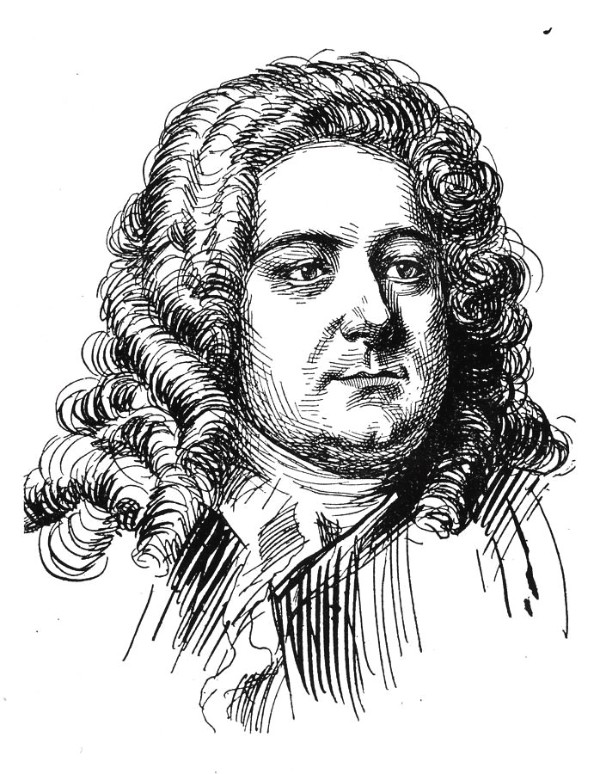Pyotr Ilich Tchaikovsky was a giant of late nineteenth century Russian music. To show their appreciation for his artistry, many of his colleagues dedicated works to him, especially after his early and unexpected death in November of 1893.
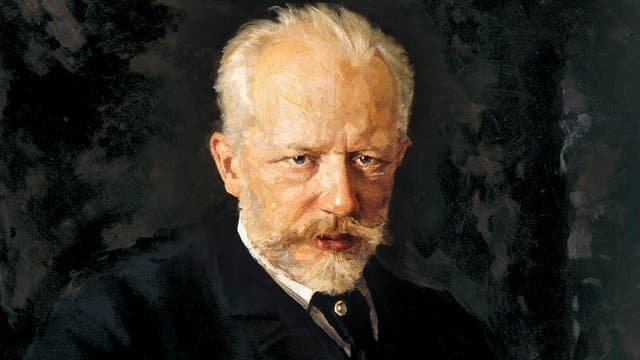
Pyotr Il’ych Tchaikovsky
Today, we’re looking at seven of the most interesting pieces of music dedicated to Tchaikovsky.
Alexander Glazunov: Symphony No. 3 (1890)
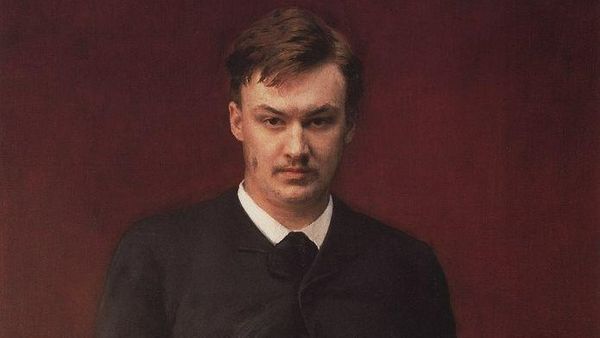
Repin: Alexander Glazunov, 1887
Alexander Glazunov: Symphony No. 3 in D Major, Op. 33 (Russian State Symphony Orchestra; Valery Polyansky, cond.)
Alexander Glazunov was born in Saint Petersburg in 1865 and began studying composition as a child.
One of his patrons was a wealthy music lover named Mitrofan Belyayev, who made his money selling timber.
In 1886, Belyayev began sponsoring a concert series known as the Russian Symphony Concerts. These concerts gave Glazunov the opportunity to write for an orchestra as a young man.
Belyayev also began a music publishing house in 1885 in Leipzig called the “M. P. Belaieff” publishing house, and published Glazunov’s work. Glazunov’s third symphony, written when he was twenty-five, was published by the company in 1890.
The work was dedicated to Tchaikovsky, who referred to Glazunov in letters as a dear friend and junior colleague.
Sergey Taneyev: String Quartet No.1, Op.4 (1890)
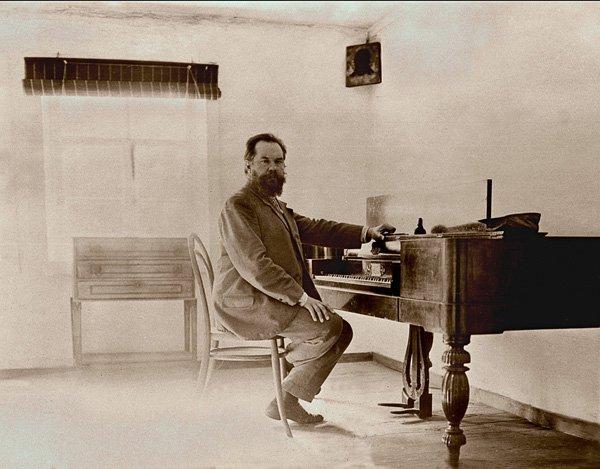
Sergei Taneyev
Sergey Taneyev: String Quartet No. 1 in B-Flat Minor, Op. 4 (Carpe Diem String Quartet)
Composer, pianist, and teacher Sergey Taneyev was born in 1856 in the Russian city of Vladimir, two hundred kilometers east of Moscow. He was a very musically talented child, and when he was nine, he enrolled at the Moscow Conservatory.
In 1871, when he was fifteen, Taneyev joined Tchaikovsky’s composition class. He graduated with gold medals in both composition and piano performance in 1875.
Taneyev and Tchaikovsky remained close even after his graduation. In 1876, Tchaikovsky dedicated his symphonic poem Francesca da Rimini to his former student. Later, in 1890, Taneyev dedicated his first string quartet to Tchaikovsky.
Interestingly, although they had an extensive correspondence, the two Tchaikovsky letters to Taneyev that survive from that year are quite snippy: “You express a desire that I should write to you, but for three months you yourself didn’t find a moment to write me at least a few lines, and then replied to my letter a month and a half after receiving it. You have been very busy, but so have I,” Tchaikovsky admonishes. Taneyev may not have found time to write to Tchaikovsky, but he did find time to write music dedicated to him.
After Tchaikovsky’s unexpected death in 1893, his brother Modest asked Taneyev if he would complete some of his works, which Taneyev did.
Sergei Rachmaninoff: Trio élégiaque No.2 in D minor, Op.9 (1893)
Sergei Rachmaninoff was born in 1873 to an aristocratic family. When he was a child, they hired a live-in piano teacher for their musically talented son.
He started studying at the Moscow Conservatory in 1885, the year he turned twelve. Tchaikovsky was on a music theory examination board when Rachmaninoff was a teenager, and he famously remarked, “For [Rachmaninoff] I predict a great future.”
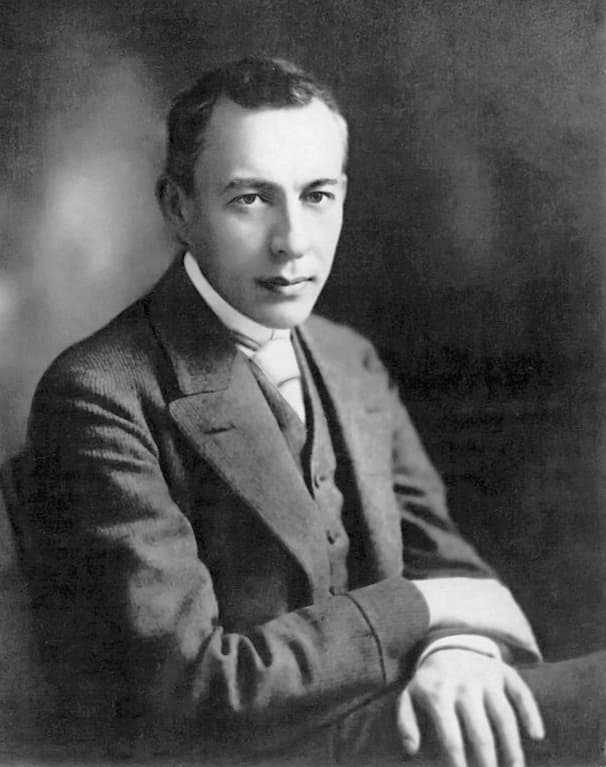
Sergei Rachmaninoff, 1901
That said, when an eighteen-year-old Rachmaninoff was entrusted to arrange The Sleeping Beauty score for piano in 1891, Tchaikovsky was not pleased with the final result, describing it as “absolutely lacking in courage, initiative and creativity!!!”
Despite the misstep, he still had faith in the young man’s talent, naming him as a name to watch out for in 1892. Rachmaninoff wrote to a friend, elated: “Tchaikovsky said [in this interview] that he would have to stop composing eventually and make way for younger people. When the reporter asked him if there really were any such young talents, Tchaikovsky answered in the affirmative and mentioned Glazunov for Saint Petersburg and me and Arensky for Moscow. That made me so glad! My hearty thanks to the old man for not having forgotten about me!”
When Tchaikovsky died suddenly the following year, Rachmaninoff was deeply saddened. He wrote a piano trio in memory of his older colleague, in much the same way that Tchaikovsky had once written a piano trio in memory of Anton Rubinstein.
Anton Arensky: String Quartet No.2, Op.35 (1894)
Anton Arensky was born in 1861 in Novgorod, Russia, a city almost two hundred kilometers to the south of St. Petersburg.
When he was eighteen, he moved to St. Petersburg to study with Nikolai Rimsky-Korsakov. After he graduated in 1882, he took a teaching position at the Moscow Conservatory (where his students included Rachmaninoff).
Eight letters between Tchaikovsky and Arensky exist. The two men must have been great friends, because Tchaikovsky ends the final surviving letter with the farewell greeting “I hug you with all my heart.”

Anton Arensky
Tchaikovsky was one of Arensky’s major musical inspirations. In 1894, the year after Tchaikovsky’s death, Arensky wrote an unusual string quartet for one violin, one viola, and two cellos, instrumentation that lends the work a dark tone.
In the middle movement, Arensky takes a theme from Tchaikovsky’s “Legend,” from 16 Songs for Children, Op. 54, and writes seven touching variations.
This set of variations became so popular that Arensky rearranged this movement for string orchestra as Variations on a Theme by Tchaikovsky, Op. 35a.
Anton Arensky: Variations on a Theme by Tchaikovsky, Op. 35a
Vladimir Rebikov: Rêveries d’automne, Op.8, No. 1 (1895)
Vladimir Rebikov was born in 1866 and studied at the Moscow Conservatory with a student of Tchaikovsky. Afterward he pursued further study in Vienna and Paris.
He is largely forgotten nowadays, but he wrote beautiful, unique music of great delicacy. His collection of miniatures, Rêveries d’automne (Dreams of Autumn), is a great example of his artistry.
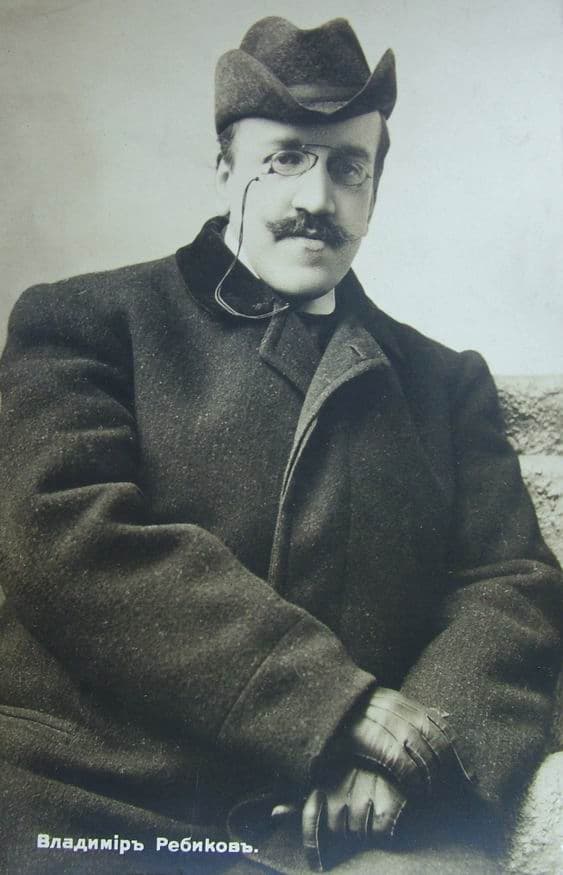
Vladimir Rebikov
The first miniature in this collection, “Chanson Triste”, was dedicated “to the memory of Pyotr Tchaikovsky.”
Sergei Rachmaninoff: 14 Romances, Op. 34, No. 8 (1912)
Rachmaninoff wrote his 14 Romances for voice and piano in 1912. The most famous piece from this collection was the fourteenth, “Vocalise,” which has been arranged and rearranged for all manner of combinations of instruments.
The eighth romance from that collection, “Music”, was dedicated to the memory of Tchaikovsky. You can hear this romance specifically at 19:51 in the video above.
Igor Stravinsky: Le Baiser de la fée, K049 (1928)
Igor Stravinsky was born forty kilometers outside of St. Petersburg to a bass opera singer and his wife. Tchaikovsky’s music ran in his blood: his father actually sang in Tchaikovsky operatic premieres!
Around 1890, when Igor was eight, he attended a performance of Tchaikovsky’s ballet Sleeping Beauty and was transfixed. He also was present at the premiere of the sixth symphony in 1893, which was immediately followed by the composer’s unexpected death: experiences that left deep musical impacts on Stravinsky.
He pursued the study of law in a halfhearted way but longed to make a life in music, and when he went to college, he fell in with Rimsky-Korsakov’s social circle. He eventually decided to leave law behind and make a life in music. The consequences for twentieth century music were immense!
In 1928, Stravinsky wrote the ballet Le baiser de la fée (The Fairy’s Kiss) as an homage to Tchaikovsky. Musicologists have pointed out anywhere from between eight to sixteen Tchaikovsky pieces referenced in the twelve-minute score: a fitting tribute, indeed.
For more of the best in classical music, sign up for our E-Newsletter

